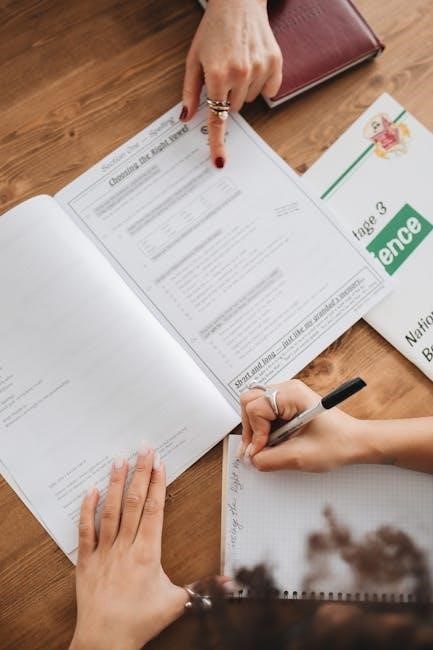Co-Dependents Anonymous (CoDA) is a worldwide fellowship for individuals struggling with codependent relationships. It offers a supportive environment to develop healthy relationships and emotional well-being through shared experiences and the Twelve Steps.
1.1 Overview of CoDA and Its Purpose
Co-Dependents Anonymous (CoDA) is a fellowship for individuals who struggle with codependent relationships. Its purpose is to provide a safe, supportive environment where members can share experiences and work together to develop healthy relationships. CoDA uses the Twelve Steps and Twelve Traditions as a foundation for recovery, empowering individuals to break free from dysfunctional patterns and achieve emotional well-being. The program focuses on personal growth, self-awareness, and healing through shared experiences and mutual support.
1.2 The Role of Literature in CoDA Recovery
Literature plays a vital role in CoDA recovery, offering guidance, inspiration, and practical tools. The CoDA book, often referred to as the “Blue Book,” provides personal stories, insights, and step-by-step guidance for working the Twelve Steps. It helps members understand codependency, set boundaries, and develop healthy communication skills. Additional resources, such as workbooks, complement the program by providing exercises to apply the principles of recovery. These materials empower individuals to heal and grow, serving as a cornerstone for personal transformation and emotional well-being.

Understanding the “Co-Dependents Anonymous” Book
The “Co-Dependents Anonymous” book, known as the Blue Book, is a foundational resource for understanding codependency patterns and recovering through shared experiences and the Twelve Steps.
2.1 The Importance of the CoDA Book in Recovery
The CoDA Book, or Blue Book, is a cornerstone in recovery, offering practical guidance and personal stories to help individuals recognize and transform codependent patterns. It provides tools and insights to foster emotional healing, encouraging members to work through the Twelve Steps. The book’s relatable narratives and structured approach make it an essential resource for understanding and overcoming codependency, supporting personal growth and healthier relationships. Its availability in PDF format ensures accessibility for those seeking recovery.
2.2 Key Themes and Topics Covered in the Book
The CoDA Book explores core themes like codependency recognition, emotional healing, and relationship patterns. It delves into personal stories of recovery, offering insights into breaking dysfunctional cycles. Topics include setting boundaries, improving communication, and fostering self-care. The book also emphasizes the role of sponsorship and service in recovery, providing practical advice for applying the Twelve Steps. These themes collectively guide individuals toward healthier relationships and personal growth, making the book a vital resource for understanding and overcoming codependency.
The Twelve Steps and Twelve Traditions of CoDA
The Twelve Steps guide recovery from codependency, fostering self-awareness and personal growth. The Twelve Traditions ensure group unity and promote spiritual principles for sustainable healing and fellowship.
The Twelve Steps are a foundational framework in CoDA, guiding individuals toward recovery from codependency. They emphasize self-reflection, accountability, and spiritual growth. By working through these steps, members gain tools to break harmful patterns, develop healthier relationships, and achieve emotional balance. Each step builds on the previous one, fostering a gradual transformation toward personal freedom and well-being. The steps are universally applicable, making them accessible to anyone seeking recovery.
3.2 Understanding the Twelve Traditions
The Twelve Traditions of CoDA are principles that guide the fellowship’s structure and unity. They ensure anonymity, prevent outside influences, and maintain the group’s primary purpose. Traditions foster trust, equality, and spiritual focus, protecting the integrity of meetings and service work. They emphasize the importance of financial self-support and nonaffiliation with other organizations. By adhering to these traditions, CoDA remains a safe, inclusive space for recovery, ensuring its longevity and effectiveness for all members seeking healing from codependency.

Finding the Co-Dependents Anonymous Book in PDF Format
The CoDA book is available in PDF format on the official CoDA website and other trusted sources. Downloading it provides easy access to recovery materials and guidance.
4.1 Where to Download the CoDA Book PDF
The CoDA book PDF can be downloaded from the official CoDA website or trusted sources like CoDA forums. Ensure authenticity by using verified links to access the material safely and reliably;
4;2 Guidance on Using the PDF for Recovery
Using the CoDA book PDF effectively involves reading it thoroughly and applying its principles. Highlight key sections, reflect on personal experiences, and discuss insights with a sponsor or group. Regularly revisit the material to deepen understanding and track progress. The PDF serves as a valuable tool for working through the Twelve Steps and fostering personal growth in recovery.

The Role of Sponsorship in CoDA
Sponsorship in CoDA provides guidance, support, and accountability, helping members navigate recovery and apply the Twelve Steps effectively, fostering personal growth and healthier relationships.
5.1 What Is Sponsorship in CoDA?
Sponsorship in CoDA is a vital relationship where an experienced member guides a less experienced one through recovery. Sponsors share their insights, provide encouragement, and offer practical advice, helping sponsees work the Twelve Steps and apply CoDA principles in daily life. This mentorship fosters accountability and supports personal growth, aiding members in overcoming codependent patterns and building healthier relationships. Sponsorship is a cornerstone of the CoDA program, promoting long-term recovery and emotional well-being.
5.2 How to Find a Sponsor
To find a sponsor, attend CoDA meetings regularly and engage with members. Ask someone whose sharing resonates with you for guidance. Be clear about your needs and expectations; Sponsors are experienced members who can offer support and share their recovery journey, helping you navigate the Twelve Steps and apply CoDA principles effectively. Building a connection takes time, so be patient and open to finding the right sponsor for your recovery path.

Working the Twelve Steps with the CoDA Book
The CoDA book guides individuals through the Twelve Steps, offering insights and practical exercises. It helps participants reflect on their patterns and behaviors, fostering personal growth and healthier relationships. The book’s structured approach provides clarity and support, making the recovery journey more manageable and meaningful.
6.1 Step-by-Step Guide to Working the Program
The CoDA book provides a systematic approach to working the Twelve Steps, offering clear guidance for each step. It begins with admitting powerlessness over codependency and moves through self-reflection, surrender, and amends. The book emphasizes the importance of sponsorship and meetings, encouraging participants to share experiences and gain insights. Practical exercises and prompts help individuals identify patterns, take responsibility, and develop healthier relationships. This structured process fosters accountability, growth, and spiritual renewal, transforming lives through actionable steps.
6.2 The Importance of Each Step in Recovery
Each of the Twelve Steps in CoDA is essential for addressing codependent patterns. Step 1 helps break denial, while Step 2 fosters hope through faith. Steps 3-9 guide self-reflection, accountability, and healing relationships. Steps 10-11 maintain awareness and spiritual growth, preventing relapse. Step 12 emphasizes service, reinforcing recovery. Together, the steps create a holistic path to emotional and relational healing, empowering individuals to build healthier connections and live authentically.

The Importance of Meetings in CoDA
CoDA meetings provide a supportive environment for sharing experiences and applying the Twelve Steps. They foster connection, accountability, and growth, helping members overcome codependency through shared wisdom and practical tools.
7.1 Types of CoDA Meetings
CoDA offers various meeting formats to suit different needs. There are Step Study meetings, where members work through the Twelve Steps; Tradition Study meetings, focusing on the Twelve Traditions; and Topic Discussion meetings, exploring specific recovery themes. Some groups also host Speaker Shares, where members share their personal recovery journeys. Additionally, there are Newcomer meetings designed to welcome and orient those new to CoDA. These diverse formats ensure members can engage in ways that best support their recovery journey.
7.2 How Meetings Support Recovery
CoDA meetings provide a safe space for sharing experiences, fostering connection, and gaining insight. Members learn practical tools for recovery, such as the Twelve Steps and Traditions, which guide behavior and attitudes. Sharing personal stories helps reduce isolation and builds empathy. Meetings also offer guidance on sponsorship and service, key components of the program. By attending regularly, individuals gain support, encouragement, and accountability, empowering them to work toward healthier relationships and personal growth.
Understanding Codependency
Codependency is a pattern of behaviors where individuals rely excessively on others for emotional validation, often leading to controlling or obsessive relationships. It stems from deep-seated fears and insecurities, creating a cycle of dependence that can be challenging to break. Recognizing these patterns is the first step toward healing and developing healthier, balanced relationships;
8.1 Defining Codependency
Codependency is a dysfunctional relationship pattern characterized by excessive emotional dependence on others. It often involves controlling or obsessive behaviors, stemming from deep-seated fears of abandonment and low self-esteem. Codependents frequently prioritize others’ needs over their own, losing their sense of identity and autonomy. This pattern can lead to unhealthy relationships and emotional distress. Recognizing these traits is crucial for seeking help and beginning the journey toward recovery, as outlined in the CoDA book, which provides guidance for breaking free from codependent cycles.
8.2 Signs and Symptoms of Codependency
Common signs of codependency include excessive emotional dependence, controlling behaviors, and fear of abandonment. People-pleasing, difficulty setting boundaries, and neglecting personal needs are prevalent. Emotional reactivity and hypersensitivity to others’ actions are typical. A tendency to enable harmful behaviors in others and a lack of self-esteem often accompany these patterns. Recognizing these symptoms is the first step toward healing and recovery, as discussed in the CoDA book, which provides tools to address and overcome codependent tendencies.

Tools for Recovery in CoDA
CoDA recovery tools include meetings, sponsorship, and the Twelve Steps, fostering emotional healing and healthy relationships, as outlined in the CoDA book for personal growth and empowerment.
The CoDA tools are essential for recovery, providing practical methods to address codependency. These tools include attending meetings, working the Twelve Steps, sponsorship, service, and self-reflection. They help members identify patterns, develop self-awareness, and build healthier relationships. Regular use of these tools fosters emotional growth and supports long-term recovery. By integrating them into daily life, individuals can achieve greater balance and emotional well-being, as emphasized in the CoDA literature.
9.2 How to Effectively Use the Tools
To effectively use CoDA tools, start by practicing self-awareness and honesty. Attend meetings regularly to connect with others and share experiences. Work the Twelve Steps with a sponsor to guide your progress. Engage in service to give back and strengthen your commitment. Use communication skills to express your thoughts, feelings, and needs clearly. Set healthy boundaries and prioritize self-care to maintain emotional balance. Consistently applying these tools helps build resilience and fosters personal growth in recovery.
Communication in Recovery
Effective communication is vital for recovery, involving clarity, honesty, and active listening. It helps express emotions, needs, and thoughts, fostering healthy connections and mutual understanding in relationships.
10.1 Improving Communication Skills
Improving communication skills involves self-awareness, expressing feelings honestly, and active listening. Codependents learn to identify their thoughts, emotions, and needs clearly. By asking themselves what they think, feel, and need, they gain clarity. Effective communication fosters healthy relationships by promoting mutual understanding and respect. It encourages setting boundaries and expressing oneself without fear of judgment. This process helps break patterns of people-pleasing and enables authentic connections, which are essential for recovery and personal growth in CoDA.
10.2 The Role of Communication in Healthy Relationships
Communication is vital in building and maintaining healthy relationships. It helps break codependent patterns by fostering authenticity and mutual respect. Expressing thoughts, feelings, and needs clearly allows individuals to set boundaries and avoid people-pleasing. Active listening and empathy strengthen connections, promoting understanding and trust. Healthy communication encourages personal growth and interdependence, enabling partners to support each other without losing their sense of self. This foundation is crucial for long-term, fulfilling relationships in recovery and beyond.

Self-Care and Boundaries in Recovery
Self-care and boundaries are essential for recovery, helping individuals break codependent patterns and develop healthy relationships. Prioritizing personal needs fosters emotional balance and independence.
11.1 The Importance of Self-Care
Self-care is vital in recovery, enabling individuals to address emotional and physical needs. By prioritizing self-care, codependents can break unhealthy patterns and develop self-awareness, fostering emotional balance and resilience. This foundational practice supports personal growth and healthy relationships, aligning with CoDA’s principles of recovery and well-being.
11.2 Setting and Maintaining Healthy Boundaries
Setting healthy boundaries is essential for recovery, as it prevents emotional overextension and promotes mutual respect. Boundaries help individuals protect their needs, emotions, and limits, fostering balanced relationships. CoDA emphasizes that boundaries are not about controlling others but about respecting oneself. By clearly defining personal limits, individuals can reduce conflict and nurture healthier interactions, aligning with CoDA’s principles of self-respect and emotional well-being.

Personal Stories and Experiences in the CoDA Book
The CoDA book shares personal stories of recovery, offering insights into codependent patterns and healing. These experiences inspire and validate feelings, helping readers connect deeply with their own journeys.
12.1 The Power of Shared Experiences
Shared experiences in the CoDA book create a profound sense of connection and understanding. Members find solace in realizing they are not alone in their struggles. These stories provide insight into the challenges of codependency and the transformative power of recovery. They illustrate how individuals have overcome similar difficulties, fostering hope and resilience. The authenticity of these accounts strengthens the CoDA community, making the journey toward healing more accessible and meaningful for all.
12.2 Learning from Others’ Journeys
The CoDA book shares personal stories that offer valuable lessons and practical wisdom. These narratives reveal how individuals identified patterns of codependency, applied the Twelve Steps, and achieved emotional freedom. By learning from others’ challenges and triumphs, members gain insights into their own recovery processes. These shared experiences foster empathy and provide practical guidance, helping readers navigate their own journeys toward healthier relationships and personal growth.

Service and Outreach in CoDA
Service and outreach are vital in CoDA, fostering recovery through helping others. Members engage in service work and share the CoDA message, spreading hope and connection.
13.1 The Role of Service in Recovery
Service in CoDA plays a transformative role in recovery, helping members develop humility and gratitude. It provides opportunities to give back, strengthen sobriety, and build meaningful connections. Through service, individuals practice the Twelve Steps, fostering personal growth and accountability. Engaging in service work not only aids others but also deepens one’s commitment to their own recovery journey, reinforcing the principles of the program. Service is thus a cornerstone of lasting healing and spiritual renewal.
13.2 Outreach and Spreading the Message
Outreach in CoDA is vital for spreading the message of hope and recovery to those struggling with codependency. By sharing resources like the CoDA book and PDF materials, members help others discover the program. Outreach efforts often involve organizing events, distributing literature, and fostering online communities. These activities not only raise awareness but also provide a lifeline for individuals seeking healing. Spreading the message ensures that no one has to face codependency alone, emphasizing the power of connection and shared recovery experiences.
The CoDA book serves as a transformative guide, offering hope and practical tools for overcoming codependency. Its wisdom empowers individuals to build healthier relationships and achieve lasting recovery through shared experiences and spiritual growth.
14.1 Summary of the CoDA Book and Its Impact
The CoDA book is a vital guide for understanding and overcoming codependency. It outlines the Twelve Steps and Traditions, shares personal stories, and offers practical tools for recovery. By addressing emotional and relational challenges, it helps individuals identify and change unhealthy patterns. The book’s impact extends beyond personal growth, fostering a supportive community that enhances the recovery journey. Its practical wisdom and shared experiences make it an invaluable resource for those seeking healthier relationships and emotional well-being.
14.2 Final Thoughts on Recovery and Growth
Recovery through CoDA is a transformative journey of self-discovery and healing. By embracing the Twelve Steps and Traditions, individuals gain tools to break free from codependent patterns. The CoDA book, with its shared stories and practical wisdom, empowers individuals to set boundaries, improve communication, and foster healthy relationships. Recovery is a lifelong process, but with persistence and support, personal growth and emotional well-being are achievable. CoDA offers hope and a path forward for those seeking to reclaim their lives and build fulfilling connections.

